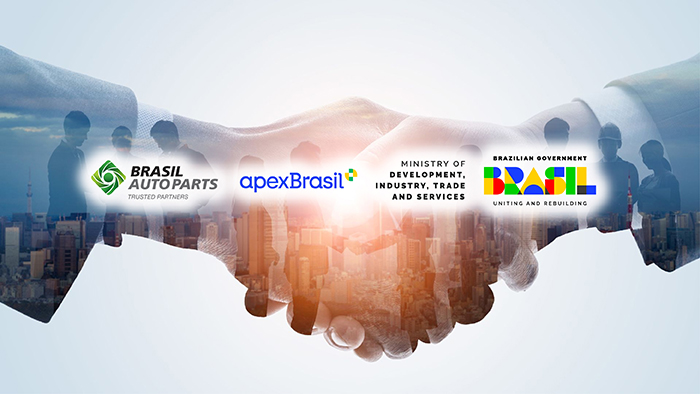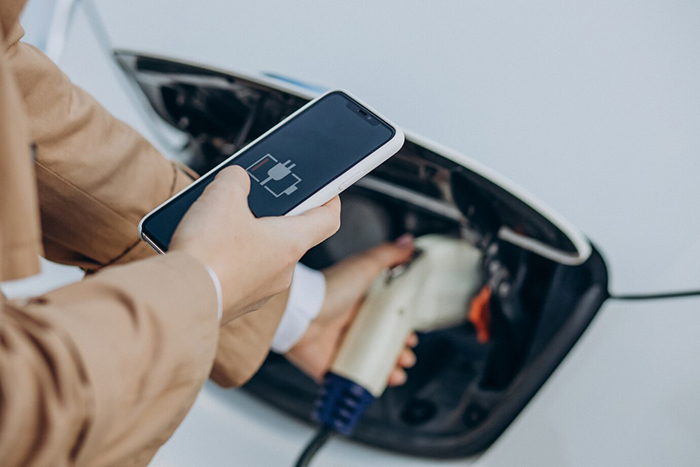
| Brasil Auto Parts prioritizes quality information | ||
 |
||
The 10th edition of the international newsletter of Brasil Auto Parts “Under the Spotlight” is out and showcases the features, value, competitive advantage, and quality of this powerful industry This issue celebrates the long-term partnership between Sindipeças - the National Association of Brazilian Auto Parts Manufacturers - and ApexBrasil - the Brazilian Trade and Investment Promotion Agency - in the Brasil Auto Parts (BAP) project. This alliance, which has existed for more than 20 years, is living proof that these partners are committed to join forces and make the automotive industry stronger, more productive, and more competitive. For Paulo Roberto da Silva, Industry and Services Coordinator at ApexBrasil, the collaboration with Sindipeças is an excellent example of the continuous and persistent effort to establish effective communication with international audiences. “We have a significant advantage when it comes to flexible technology for hybrid vehicles, for example. So, it is crucial to pass on this information to the international audiences clearly, directly, and efficiently so we can create and inspire business opportunities and partnerships”, says da Silva. Since 2021, this international newsletter has published more than 40 news stories highlighting BAP's achievements. It is not only an informational platform, but also a catalyst for the industry's growth. It brings together manufacturers, disseminates news on innovation, and makes foreign markets aware of the competitive advantages of the Brazilian auto parts industry. “This communication takes place within the scope of the Brasil Auto Parts Project, through strategic management of initiatives to boost deals and promote corporate image”, says Paulo Roberto da Silva. “The Brazilian auto parts industry plays a vital role in supporting the automotive sector, which is one of the largest in Brazil. We work through BAP to enable our international customers to also benefit from this expertise”, says George Rugitsky, Director for Economy and Market Strategy at Sindipeças. “We not only provide high-quality components, but we also stand out for our ability to work with a clean energy matrix, which makes Brazil competitive in this field, and turns it into a key player at this moment of mobility transition”, adds Rugitsky. If you are interested in learning more about BAP's initiatives, please follow our publications on the about us page of our website, and on the project's social media profiles. |
||
| Brasil Auto Parts takes a hands-on approach to boosting business | ||
 |
||
In activities developed in South Africa, Chile and Brazil, Brazilian companies participating in BAP were supported to strengthen their international sales strategy in 2023 In the first week of October, the cities of São Paulo (Oct 2-4) and Caxias do Sul (Oct 5-6) hosted the 13th edition of the Buyer Project, one of BAP’s busiest trade promotion events. The project welcomed 14 importers from nine Latin American countries which participated in 576 business meetings and went on 16 technical visits to Brazilian companies. They came from Argentina (Repuestos Tablada), Bolivia (Unipartes), Chile (Dercomaq and Fordino), Colombia (CMJ and Divemotor), Costa Rica (AutoStar and Repuestos Tiribi), Ecuador (Electric Jordan), Mexico (Auto Electrica Diesel and RGDAYA), Paraguay (Repuestos Toyo-Benz) and Peru (Gromar and Renusa). On the Brazilian side, there were 86 participants. “The Buyer Project is an excellent way to get to know potential foreign customers without having to travel. This is of great help to Brazilian companies willing to export”, says Walter Teles, consultant from the Brazilian company K Parts.“We need as many suppliers as possible because we work with original products to serve our customers in Costa Rica. We already know some Brazilian manufacturers and buy their products, and their quality is much higher than in Asia”, says AutoStar's representative, Luis Jiménez. Wilson Tadeu Constantino, a representative of Viemar and a member of BAP’s Steering Committee who has been working in auto parts exports for 13 years, says: “the Brazilian flag helps to increase the trust of those who do not yet know the delivery capacity of the industry. Brasil Auto Parts provides full support for beginners and speeds up the process for more mature companies,” says Constantino. Wabtec Brasil was another Brazilian company that participated for the first time in the business roundtables organized by BAP. “We’ve recently joined the project, and we were able to prospect for new business right from the start. It was extremely productive and we believe that we will reap many benefits in the years to come”, says Samantha Pasqualini Mathias, the company’s export analyst. For trade promotion purposes, our Trusted Partners participated in Automechanika Johannesburg, held in early September (5-7). There were a total of 14 exhibitors at the Brazilian pavilion (Autolinea, Biagio Turbos, Master Power, Centralsul, DNI, Duroline, RIOsulense, Maringá, Orgus, Top Relay, D.S. Schiavetto, Quinelato, Tecfil and Suporte Rei). At the end of the event, the participants made 231 business contacts (198 new ones), earned USD 605,000 in immediate business, and estimated a potential revenue of USD 2,130,000 in the next 12 months. Visitors came from South Africa and countries such as Greece, Mozambique, Namibia, Zambia, and Zimbabwe. Master Power attended the event as an exhibitor for the second time. Gustavo Borghetti, a representative of the company, saw the fair as a very good opportunity to meet current clients and prospect new business contacts. In his own words, “the trade show brought together regional players, providing a great opportunity for business exchange and opening up the possibility of increasing trade in Africa.” Sebastian Hurtado, Tecfil's International Sales Manager, also thought the event was “a great opportunity to meet large distributors and develop business in South Africa and other countries in the region”. In September, BAP’s members also participated in an event in Chile, one of the target countries in the project’s strategic plan for 2023-2024. Vinicius Gerard, Export Promotion Analyst at Brasil Auto Parts, made a panel presentation on the challenges and opportunities in the Latin American aftermarket during the Motortec fair. “The experience was invaluable, and this meeting has strengthened the ties among important representatives of the automotive industry in South America”, says Gerard. From October 31 to November 2, we will be hosting a pavilion at the AAPEX trade show in Las Vegas, United States. From November 12 to 18, we will be taking part in the Agritechnica Hannover in Germany. Pay us a visit! For more details on Brazilian auto parts manufacturers and their products, please click. |
||
| Is mobility transition a reality by now? | ||
 |
||
The Brazilian automotive industry is keeping up with global trends and has been investing heavily in innovations that are aligned with consumer demand for sustainable mobility The vehicle electrification trend has brought about a major transformation in the behavior of the global market. To better understand this dynamic and the scenario, Sindipeças and the Brazilian Association of Automotive Vehicle Manufacturers (Anfavea) have decided to shed light on the subject. The Boston Consulting Group (BCG) was hired to assess the impact of this transition on the industry and conducted a survey with manufacturers associated with Sindipeças to learn about the perception of supply chain players about the vehicle electrification process in Brazil. In general, the answers showed that suppliers are attentive to this trend and have been updating their product portfolios. “The transition to hybrid vehicles in the coming years can be seen as an intermediate stage”, the report says. The survey was answered by 80 respondents: 65 answers were provided online and 15 interviews were conducted with executives from large companies. The results point to a clear conclusion: vehicle electrification is real and requires immediate action. This way, the Brazilian automotive industry needs to adapt its product portfolio to the new technologies and become involved in this process by developing a corporate strategy and positioning itself in the Brazilian and international market. After all, innovations occur in an interconnected chain of events and involve several factors. Decarbonization is a challenge that cannot be ignored, and the trend points to the increasing presence of electrification in all categories of mobility, from light to heavy vehicles. For industry suppliers, this change is also an opportunity. According to data from the survey, lines of electrified vehicle components will certainly be developed in Brazil. However, the transition will be gradual, with present and future technologies coexisting for some time. In this respect, vehicle electrification can undoubtedly be seen as a point of no return. The Brazilian automotive industry is preparing to face this challenge and bravely embrace this transformation, because it is known that companies which invest intelligently in these new technologies will be at the forefront and play a key role in the future of mobility in Brazil and in the world. Click the following link link to see the full survey content. |
||
Sindipeças is engaged in the “Green Mobility” program from the beginning, as a representative of the Brazilian auto parts industry, and seeks to emphasize the need for investment in research and development programs so that new technologies can be produced in the country. Manufacturing electrified vehicle components in Brazil is an issue on the agenda, as is transitioning to clean vehicles and fuels. The “Green Mobility” program also addresses issues relating to international trade and the competitiveness of Brazilian industry in the global market, which brings advantages to companies that import from the country. |
||
 |
|
|
